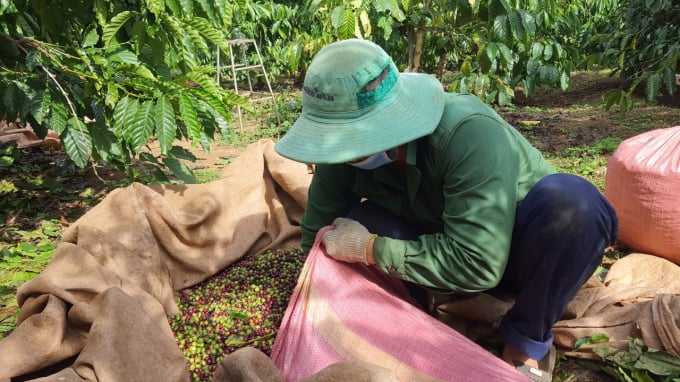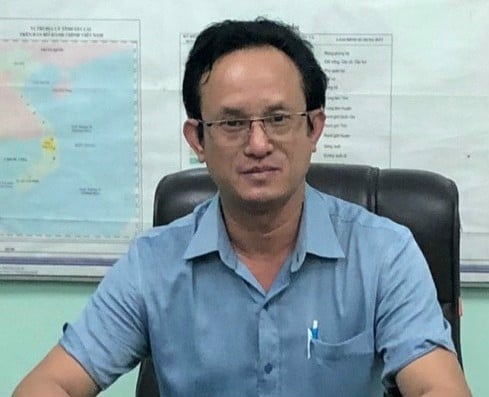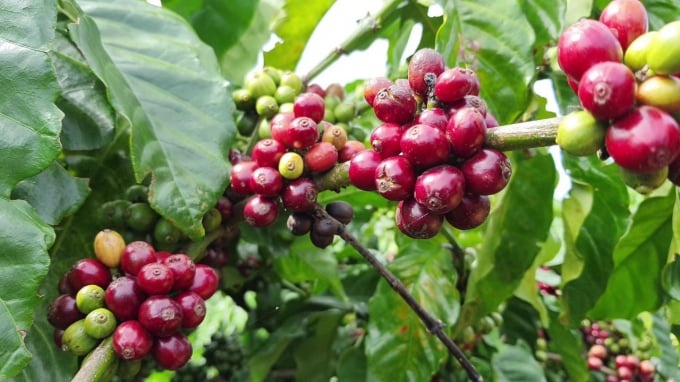November 27, 2025 | 23:49 GMT +7
November 27, 2025 | 23:49 GMT +7
Hotline: 0913.378.918
November 27, 2025 | 23:49 GMT +7
Hotline: 0913.378.918
After six years of the Vietnam Sustainable Agriculture Transformation Project (VnSAT) program, people in Gia Lai province are brim with excitement.
The quality of coffee has been improved significantly. Coffee production has been carried out following a link chain between farmer organizations, cooperatives and businesses.

Gia Lai coffee is in the harvest season. This year's quality is expected to be better than the previous years. Photo: Tuan Anh.
Upon sharing with Vietnam Agriculture News, Mr. Doan Ngoc Co, Deputy Director of Gia Lai Department of Agriculture and Rural Development said that 15,230 coffee farmers in the province have attended Farmer Field School (FFS) training courses on sustainable coffee farming organized by VnSAT. Accordingly, 70% of farmers have successfully followed the technical criteria of sustainable coffee farming and put them into production practice.
VnSAT has shown its support through the installation of water-saving irrigation systems on 187 ha of commercial coffee. The systems quickly gain farmers’ favor thanks to their high economic efficiency in the context of climate change, with prolonged drought in the Central Highlands dry season.
In terms of organization, the VnSAT program has helped establish 21 farmer organizations, cooperatives and cooperative groups. Coffee production cooperatives increase their activeness through a series of training sessions on organization, management and application of new production techniques.
VnSAT has also helped to improve product quality as well as joint ventures, production links, and product underwriting with enterprises such as Vinh Hiep, Ngoc Chuong, etc.

Mr. Doan Ngoc Co, Deputy Director of Gia Lai Department of Agriculture and Rural Development.
How do you assess the organization of models in production, processing and connecting businesses to consume products according to the value link chain of farmer organizations, cooperatives and businesses in Gia Lai supported by VnSAT?
VnSAT's organization of models in production, processing and connecting businesses to consume products according to the value link chain of VnSAT is proceeding well at the moment, bringing high socio-economic efficiency.
Several prime examples include the association between farmer organizations, cooperatives and Vinh Hiep Company. Later cooperatives such as Ia Mo Nong, Dak Krong, Phuong Hoang have provided thousands of tons of coffee to Vinh Hiep Company for export.
What are the impacts of VnSAT on the coffee industry in particular and the local agriculture sector in general that confirm the program’s effectiveness and success, thereby replicating the models, sir?
Coffee production practices have been oriented towards the sustainable path.
Instead of separate and spontaneous production, now local authorities and coffee producers have moved towards organized production through the establishment of sustainable coffee production cooperatives.
Coffee producers are now aware of the importance of improving the quality of co-branded products. VnSAT has provided support to cooperatives to develop product traceability codes (QR codes), making their first steps towards successful application of international production criteria such as 4C, Rain forest, Organic.

Farmer's coffee quality has been significantly improved through the VnSAT program. Photo: Tuan Anh.
Before the program, coffee products consumed by people in the area were mainly fresh coffee. Now the composition of coffee products has fundamentally changed in line with the orientation of increasing investment in processing value-added products.
Specialized establishments under the Department of Agriculture and Rural Development have been continuing to improve their capacity. Their goal is to effectively support and meet the province's demand concerning sustainable coffee production by updating and providing technical, technological, market information to coffee producers.
What are the difficulties and obstacles during the implementation of VnSAT in recent years? Are there causes as well as solutions to these matters, sir?
The biggest difficulty during the implementation of VnSAT is the ability to contribute capital to infrastructure sub-projects as well as goods and equipment of people, farmer organizations, cooperatives.
As the price of coffee has been at a low level for many years, input prices are in constant increase. Severe weather conditions such as cases of drought lead to lack of water for irrigation on a large scale. The link of the standard coffee production chain between farmer households, cooperatives and businesses remained unprofound.
However, the situation in recent years has turned to a bright side when people and farmers' organizations have raised their awareness through training and schooling courses organized by the program. The quantity and quality of coffee products consumed through contracts between enterprises and cooperatives have therefore greatly increased.
Thank you, sir!
The current implementation progress of infrastructure sub-projects in the project extension period is still guaranteed within the 2021-2022 plan. Due to the impact of Covid-19, unable to gather a large group of people, activities such as training and coaching are severely affected.
Contrary to the hardship, the VNSAT program still overcomes and closely follows the plan and schedule. Apart from the program's activities mainly initiated in 2019, the rest of the public infrastructure sub-programs will be completed and handed over to put into use before June 30th, 2022 (loan closing period).
(Mr. Doan Ngoc Co, Deputy Director of Gia Lai Department of Agriculture and Rural Development)
Translated by Samuel Pham

(VAN) According to Mr. Vo Minh Thanh, Director of the Tay Ninh Department of Agriculture and Environment, Resolution 57 has created a new development pathway for the locality, shifting from traditional toward modern agriculture.
/2025/11/26/4909-2-154329_878.jpg)
(VAN) Pearl grouper farming in HDPE cages not only delivers economic efficiency but also contributes to protecting the environment, creating jobs, and promoting marine-based experiential tourism.

(VAN) The model of making a living under the forest canopy through the agroforestry system in Van Son commune, Bac Ninh province, is expected to generate an annual income of approximately VND 30 million/ha.

(VAN) Many enterprises in Can Tho are harnessing natural energy and reducing greenhouse gas emissions in their production processes, thereby contributing to the promotion of a sustainable green transition.
/2025/11/24/3536-2-112800_176.jpg)
(VAN) Dong Nai now has tens of thousands of hectares of forests certified for sustainable management, and this area will continue to be expanded in the coming period.

(VAN) Vinh Ha hamlet (Dai Xuyen commune, Hanoi) is shifting away from small-scale farming as households adopt bioscurity into their breeder chicken models.

(VAN) Heavy rains make aquatic species more vulnerable to disease. Proactive water management and high-tech systems help farmers prevent outbreaks and protect yields.